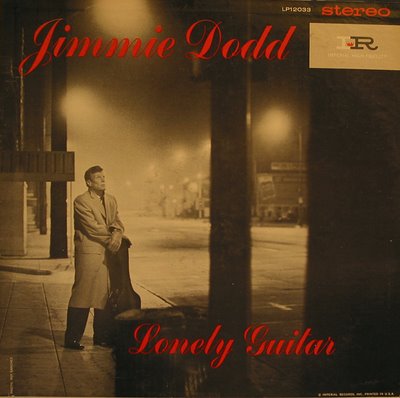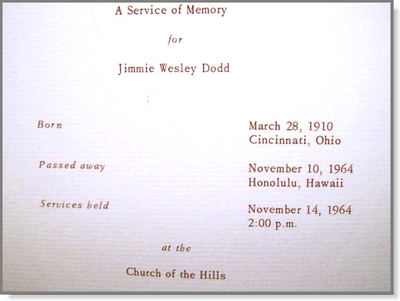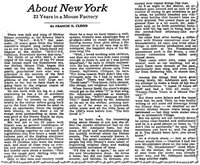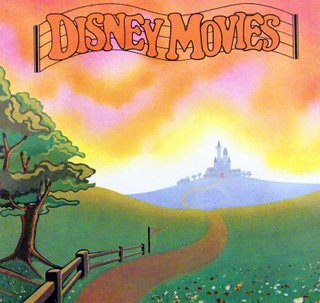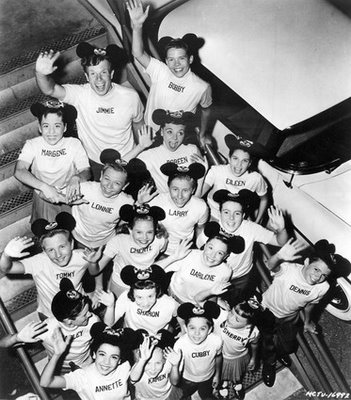 The original Mickey Mouse Club presented five new hour-long episodes each week during the 1955-’56 and 1956-’57 TV seasons.
The original Mickey Mouse Club presented five new hour-long episodes each week during the 1955-’56 and 1956-’57 TV seasons.
In ‘57-’58, the show started slipping away, cut to five half-hour programs per week.
In ‘58-’59, the lights were still on in Mickey’s Clubhouse, but nobody was home.
Production had shut down, and Disney resorted to re-cut half-hour reruns. The loyal viewers who remained to watch the repeats had the unusual opportunity to relive a portion of their childhood while they were still children.
By the Autumn of 1959, these kids had no idea what to do with themselves at 5 p.m. on weekdays. It was in that forlorn condition that they entered the sixties, mere months later, which might just explain the entire decade.
After three years of clublessness, reruns of the show again became available through local syndication, and MMC ran in this manner for another three years, from 1962 through 1965.
 If you were eight when the show had premiered, you were a teenager by the second go-round, and distinctly embarrassed if not appalled by how much you used to love this juvenile entertainment. It was left to a new group of eight-year-olds to pick up Mickey’s fallen banner.
If you were eight when the show had premiered, you were a teenager by the second go-round, and distinctly embarrassed if not appalled by how much you used to love this juvenile entertainment. It was left to a new group of eight-year-olds to pick up Mickey’s fallen banner.
As the Mickey Mouse Club returned to the air in September of 1962, the Beatles went into the studio with their new drummer, Ringo Starr, to record six tracks. By the time the MMC “went dark” again, the Beatles had played Shea Stadium and received their MBE’s.
The show then made a strong bid for obscurity, remaining “dark” for ten long years. Depending on my math skills – and the month of our fictional eight-year-old’s birthday – the kid is now 28.
 Not old – but not feeling so young, either. “The Sixties” really began in ‘63 or ‘64 (the Kennedy assassination or The Beatles, take your pick) and really ended in ‘74 or ‘75 (Watergate or the draft, your pick once again). This third time around elicited acute nostalgia from the original audience, now fueled by memories of what, in retrospect, seemed a far simpler time. Some of them were watching as the Club reconvened on January 20th, 1975, when the second series of reruns began.
Not old – but not feeling so young, either. “The Sixties” really began in ‘63 or ‘64 (the Kennedy assassination or The Beatles, take your pick) and really ended in ‘74 or ‘75 (Watergate or the draft, your pick once again). This third time around elicited acute nostalgia from the original audience, now fueled by memories of what, in retrospect, seemed a far simpler time. Some of them were watching as the Club reconvened on January 20th, 1975, when the second series of reruns began.
That same evening, The Tomorrow Show With Tom Snyder videotaped an episode featuring original Mouseketeers Darlene Gillespie, Sharon Baird, Lonnie Burr, Cubby O’Brien, Tommy  Cole, and Cheryl Holdridge (who died earlier this month at 64). For the many original viewers who were now allowed to stay up late and watch people smoke, the hour-long Tomorrow Show was the electronic equivalent of a grade-school reunion. And, especially for those who were watching their first rerun, it must have been something of a shock.
Cole, and Cheryl Holdridge (who died earlier this month at 64). For the many original viewers who were now allowed to stay up late and watch people smoke, the hour-long Tomorrow Show was the electronic equivalent of a grade-school reunion. And, especially for those who were watching their first rerun, it must have been something of a shock.
You see, each morning, you get up, you look in the mirror, and, barring misfortune, you see almost exactly the same face you saw yesterday and will see tomorrow. You never see yourself age. You only come to realize how old you are obliquely, by encountering some other face you haven’t seen in a long while. At that point, logic kicks in: I don’t feel older, but if that person is older, then I must be older.
If it weren’t for those damn Mouseketeers, and those damn memories of winter days when the fading sunlight in our TV rooms imperceptibly accomplished a cross-dissolve with the blue glow from our black and white sets, we could have stayed young forever.
As always, I suggest a visit to The Original Mickey Mouse Club Show fan site.
Why? Because I like you.
